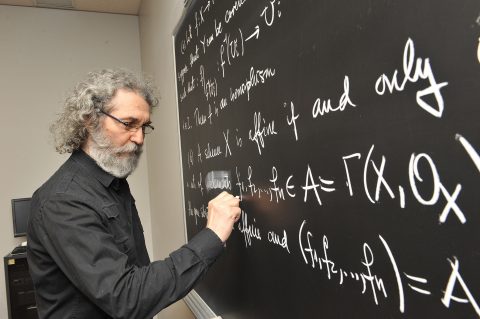Economics (BComm)
Events for Future John Molson Students
Want to learn more about studying business at Concordia? Join us to learn about the John Molson School of Business' undergraduate programs and how they can help support your career goals. Join us for a tour, an information session, or one of our many other events!
Why study Economics?
Want to see the big picture? At the John Molson School of Business, our Economics major is applied. Because we look at the world though a business lens, you don’t just analyze data to discover how society, politics and the environment interact with business, you also develop business strategies and organizational tactics to tackle economic problems big and small.
In an Economics major in the John Molson School of Business BComm degree, you’ll:
- Study all our core Commerce curriculum
- Acquire a sound background in economic theory
- Place an applied emphasis on organizational analysis and consulting
- Focus on large and international businesses or small enterprises
- Develop sustainable, ethical and competitive management skills
- Choose business-related minors to complement your Economics major
Program highlights
- Compete in national and international case competitions while developing skills to apply economic thinking to real-world situations
Special funding for out-of-province students
Up to $4000 for undergraduate programs.
Program structure
Program options
A Bachelor of Commerce degree takes a minimum of three or four years (90 - 120 credits) of full-time study, depending on your academic background.
All John Molson School of Business students follow a core business curriculum coupled with a John Molson School of Business major, which may be combined with a minor in another discipline or any combination of elective courses that interest them.
- Core business courses (48 credits)
- Economics major courses (24 credits)
- Electives (18 credits) which may include a business minor (12 credits)
A Minor in Economics (12 credits) is only available to John Molson School of Business students already in the program. A minor will fulfil the 12 elective credits in your BComm and complement your major field of study.
Courses
United States students: A U.S. Federal Student Aid-eligible version of this program is offered. This version meets all U.S. regulations (such as no co-operative education or e-courses) for eligible programs.
Admission criteria
Minimum cut-off averages and course requirements
- Quebec CEGEP: 27 overall, 26.5 math
- Pre-university:
- Average of 26.5 from Calculus 1 and Linear Algebra
- Applicants are eligible for admission once they have completed at least one of these two math courses. The other must be completed during the first year at Concordia.
- Strongly recommended that applicants complete both courses at CEGEP
- Professional/technical:
- Those completing a technical DEC in a business-related field may be eligible for admission.
- Students who have completed Calculus I and/or Linear Algebra must achieve an average of 26.5 in mathematics.
- Student without Calculus 1 or Linear Algebra, must have achieved a minimum of 75% in Secondary 5 Math (SN, TS or MATH 536). Your high school Quebec Achievement Record must be included with your application. If admitted, you will be required to complete all missing prerequisite courses as elective credits at John Molson.
- Additional information for CEGEP applicants
- Pre-university:
- High School: B overall, B in math
- One math from Pre-Calculus, Calculus, Algebra II, College Algebra or equivalent
- Canadian curricula course requirements
- Accepted international qualifications
- ACT or SAT is not required
- AP exams are not required but may qualify you for advanced standing
- International Baccalaureate (IB) diploma: 29 overall, 4 HL or 5 SL math
- one math (Applications and Interpretations HL, Analysis and Approaches HL or Analysis and Approaches SL)
- International Baccalaureate Career-related Programme (CP): 4.8/7 overall, 4 HL or 5 SL math
- one math (Applications and Interpretations HL, Analysis and Approaches HL or Analysis and Approaches SL)
- Additional Career-related Programme (CP) course requirements
- Baccalauréat français: 13 overall, 13 in math
- Required courses:
- Première : Spécialité mathématiques
- Terminale : Mathématiques complémentaires (Spécialité mathématiques recommended)
- Additional information for Baccalauréat français applicants
- Required courses:
- British system of education (GCE):
- A-levels: At least two A-level exams CC, C in math or
- AS-levels: At least 4 AS-level exams with equivalent results or
- BTEC: Level 3 Diploma or Extended Diploma in a related subject area with equivalent results
- Students without A-level math may be admissible based on AS-level or iGCSE/GCSE/O-Level exam results. Students should include all their exam results from iGCSE (or equivalent) onwards to support their application.
- Additional information for British System of Education (GCE) applicants
- University transfers (internal): 2.7 overall, 2.7 in math
- ECON 201, ECON 203 (or have exemptions)
- MATH 208 and MATH 209 (or have exemptions)
- Additional information on Internal Degree Transfer
- University transfer (external): B- overall, B- in math
- Courses in the disciplines of Calculus and Linear Algebra
Minimum cut-off averages should be used as indicators. The cut-off data may change depending on the applicant pool. Applicants who meet the stated minimum requirements are not guaranteed admission to these programs.
Application deadlines

FALL ENTRY (September)
Deadline: March 1
U.S. and international applicants: Apply no later than February 1 to allow time for immigration document processing. However, applying earlier is strongly recommended. Immigration processing times vary by country and delays could prevent you from starting your studies on time.

WINTER ENTRY (January)
Deadline: November 1
U.S. and international applicants: Apply no later than August 1 to allow time for immigration document processing. However, applying earlier is strongly recommended. Immigration processing times vary by country and delays could prevent you from starting your studies on time.
We reserve the right to close admission to a program at any time after the official deadline without prior notice.
Student story

Longyu Li
Major in Human Resource Management
Major in Economics
An international student from China, Longyu Li helps first-year students build their new home at Concordia’s residences.
Other programs of interest

Interest rates, budget deficits, social services, taxes and sustainable economic growth: Economic problems sit at the forefront of public debates. As an economist, your work informs business leaders and policy makers who must make decisions with lasting economic consequences.
Department
Faculty

Mathematics is a language that answers real-world questions in science and engineering. Statistics is the science of information.
Department
Department of Mathematics & Statistics
Faculty

Political science teaches you how the world works. As one of Concordia’s most popular degree choices, you will meet the world up close: in class, in action and in person.
Department
Department of Political Science
Faculty

